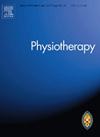Development and implementation of a physiotherapy exercise intervention with tailored support for exercise adherence for people with vertebral fragility fractures (OPTIN trial)
IF 3.1
3区 医学
Q1 REHABILITATION
引用次数: 0
Abstract
Objectives
The OsteoPorosis Tailored exercise adherence INtervention (OPTIN) trial is a two-arm, multi-centre randomised controlled trial. It compares the effectiveness of physiotherapy exercise rehabilitation with integrated support for exercise adherence, to physiotherapy exercise rehabilitation alone, for people with vertebral fragility fracture (VFF) and back pain. This paper describes the development of the physiotherapist-led adherence enhanced intervention.
Methods
We used an intervention mapping approach and followed Medical Research Council guidelines for developing complex interventions. We co-created the intervention involving expert clinicians, service managers, researchers, and adults with long-term musculoskeletal conditions, including osteoporosis. We identified a theoretical framework, reviewed the evidence, used a feasibility study, and considered clinical practice and deliverability within UK National Health Service (NHS) outpatient physiotherapy secondary care. Through a collaborative workshop, we refined the intervention, involved patients again and re-tested the intervention. Finally, we manualised the intervention, produced patient and physiotherapist materials and trained physiotherapists for delivery.
Results
The OPTIN intervention uses a motivational interviewing approach and captures information about patient goals, barriers, and facilitators to exercise. Physiotherapists assess exercise capability, opportunities and motivation and utilise at least three behaviour change approaches, selecting from an intervention toolkit of nine approaches to support exercise behaviour. Ninety minutes of additional physiotherapy are provided to deliver the intervention, integrated within the assessment and six follow-up visits.
Conclusions
A theory-informed intervention to support exercise adherence was developed and delivered by physiotherapists trained in the intervention to older adults with VFF and back pain in the intervention arm (n = 63) of the OPTIN trial.
Trial Registration number
ISRCTN 14465704.
Contribution of Paper
- •Describes the development of an intervention to support adherence to physiotherapy exercise for people with vertebral fragility fracture.
- •Reports in detail the intervention for replication.
开发和实施物理治疗运动干预,为椎体脆性骨折患者的运动依从性提供量身定制的支持(OPTIN试验)
骨质疏松量身定制的运动坚持干预(OPTIN)试验是一项双组、多中心随机对照试验。它比较了物理疗法运动康复与综合支持运动坚持的效果,与单独的物理疗法运动康复,对于椎体脆性骨折(VFF)和背部疼痛的人。本文描述了物理治疗师主导的依从性增强干预的发展。方法采用干预绘图方法,并遵循医学研究委员会制定复杂干预措施的指南。我们与临床专家、服务经理、研究人员和患有长期肌肉骨骼疾病(包括骨质疏松症)的成年人共同创建了干预措施。我们确定了一个理论框架,回顾了证据,进行了可行性研究,并考虑了英国国家卫生服务(NHS)门诊物理治疗二级护理的临床实践和可交付性。通过合作研讨会,我们改进了干预措施,再次让患者参与进来,并重新测试了干预措施。最后,我们对干预进行了手工操作,制作了患者和理疗师的材料,并对理疗师进行了培训。结果OPTIN干预采用动机性访谈方法,并获取有关患者目标、障碍和促进运动的信息。物理治疗师评估运动能力、机会和动机,并利用至少三种行为改变方法,从九种方法的干预工具包中选择支持运动行为。提供90分钟的额外物理治疗以提供干预,纳入评估和六次随访。结论:在OPTIN试验的干预组(n = 63)中,经过干预训练的物理治疗师开发了一种理论知情的干预措施,以支持运动依从性。试验注册号为isrctn 14465704。•描述了一种干预措施的发展,以支持椎体脆性骨折患者坚持物理治疗运动。•详细报告复制的干预。
本文章由计算机程序翻译,如有差异,请以英文原文为准。
求助全文
约1分钟内获得全文
求助全文
来源期刊

Physiotherapy
医学-康复医学
CiteScore
6.40
自引率
3.00%
发文量
377
审稿时长
82 days
期刊介绍:
Physiotherapy aims to publish original research and facilitate continuing professional development for physiotherapists and other health professions worldwide. Dedicated to the advancement of physiotherapy through publication of research and scholarly work concerned with, but not limited to, its scientific basis and clinical application, education of practitioners, management of services and policy.
We are pleased to receive articles reporting original scientific research, systematic reviews or meta-analyses, theoretical or debate articles, brief reports and technical reports. All papers should demonstrate methodological rigour.
 求助内容:
求助内容: 应助结果提醒方式:
应助结果提醒方式:


